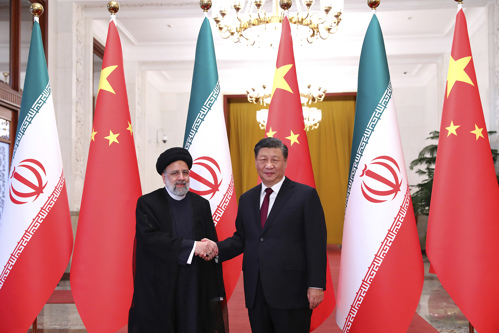White House officials described the talks as “very positive and constructive,” and the two sides are expected to meet again this Saturday in Rome, a venue change suggested by the U.S.
But talks can’t be open-ended if President Donald Trump is going to stand behind a two-month deadline for a decision he issued to Iran’s Supreme Leader Ali Khamenei in a letter Trump sent in early March. Trump demanded a nuclear deal with the U.S. by the deadline, or Iran almost certainly would face military action.
"If they don't make a deal, there will be bombing," Trump said last week. "It will be bombing the likes of which they have never seen before."
Retired Army general and Delta Force commander Jerry Boykin warned last week that the longer talks continue, the more time Iran has to fine-tune a nuclear program that right now has enough enriched uranium to build seven warheads. It’s a strategy Iran has used before.
“Already you’re beginning to see a little bit of tension creep into the conversation because of the pace of the negotiations,” Ilan Berman, a U.S. defense and intelligence consultant, said on Washington Watch Monday.

“The Iranians have a very vested interest in having negotiations last longer. The White House really wants them to be short and to the point. The question is, how many cycles of this can we have, can we go through before there's really an understanding that the Trump administration means business?” Berman told show host Tony Perkins.
The U.S. has increased its forces within the region having sent two aircraft carriers with B-2 and B-52 bombers, as well as sophisticated air defense systems. The B-2s carry the Massive Ordnance Penetrator (MOP) bombs, also known as the "bunker busters," which are necessary to reach Iran's deeply buried and fortified nuclear targets. Each B-2 carries two MOPs.
The calendar in mind
While another round of talks in a new location is added, Trump talks like a man intent on holding to a date on the calendar. “We’ll be making a decision on Iran very quickly,” he told reporters aboard Air Force One Monday.
Axios quoted a source saying the first round of talks were “substantive, serious and excellent.”
Berman believes things will come to a head soon, that Trump is not for dragging this thing out. A sixth sense of “being played” could kick in, and Trump won’t be part of the strategy of delay.
“That’s the reason why the President said when he sent the initial letter offering negotiations to the Iranians, he set a two-month time frame. That clock is now ticking, right? It's been ticking since this weekend.”
 The Trump administration wants action for a number of reasons, one being international sanctions against Iran are set to expire under certain conditions.
The Trump administration wants action for a number of reasons, one being international sanctions against Iran are set to expire under certain conditions.
Specifically, the provision for snapback sanctions – which allows any participant in the Joint Comprehensive Plan of Action (JCPOA) to unilaterally call for the reimposition of sanctions if Iran is found to be violating the agreement – is set to expire on Oct. 18. This expiration coincides with Russia's leadership of the United Nations Security Council presidency for its one-month rotation.
Berman explained that international diplomacy doesn’t happen quickly – and “every week we wait Iran marches a little bit closer to the nuclear weapons threshold,” he said. “The White House really wants a definitive answer soon; and for the exact same reasons, Iran wants not to give a definitive answer soon.”
Iranian officials attend a friendlier meeting
This nuclear conversation isn’t just one way with Trump standing and shaking a finger at Iran. Officials from Iran, Russia and China met in Moscow earlier this month for their own nuclear discussions.
The three have met before “in order to coordinate stances at the international assemblies and achieve solutions to fruitful negotiations about the removal of sanctions [against Iran]” wrote the Tasnim News Agency, an Iranian state media outlet. This most recent meeting was for the same purpose, Berman explained.
 “Iran is going to nudge Moscow and Beijing into trying to play a larger and larger role in the negotiations, trying to broker some sort of multilateral agreement. By default, because both Russia and China are strategic partners of the Islamic Republic, this is going to be an agreement where it's three against one,” he said.
“Iran is going to nudge Moscow and Beijing into trying to play a larger and larger role in the negotiations, trying to broker some sort of multilateral agreement. By default, because both Russia and China are strategic partners of the Islamic Republic, this is going to be an agreement where it's three against one,” he said.
Russia’s participation in talks with Iran is interesting given its ongoing war in Ukraine where Trump has tried, so far unsuccessfully, to broker a peace deal. Instead, Russian attacks continue in Ukraine. A ballistic missile attack on Sumy over the weekend killed at least 34 people and injured 117 others, 15 of them children.
“The Russians are not a disinterested party here,” Berman stated. “If they help out with the Iranians, I think they get a longer leash when it comes to Ukraine.”







